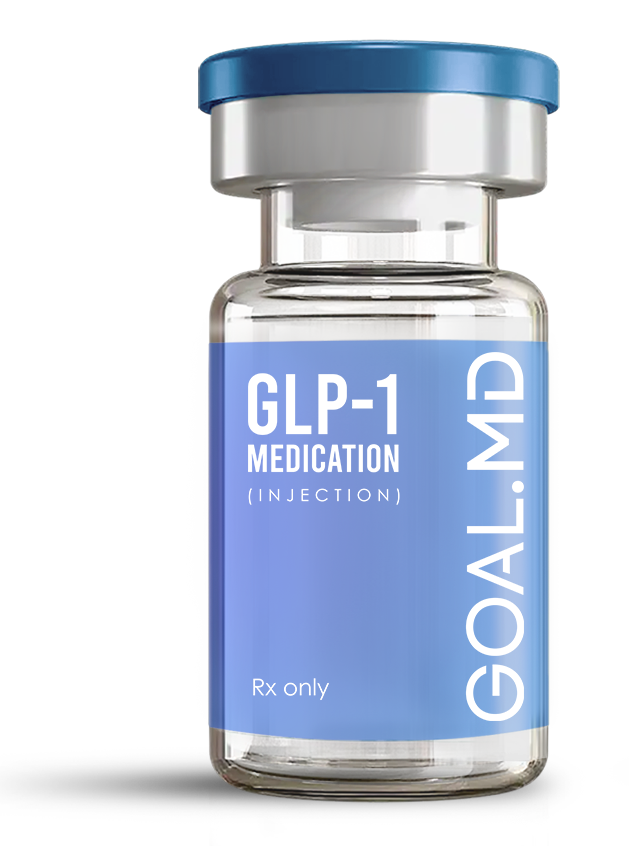
GOAL.MD Health & Wellness Blog
Evidence-based insights, medical weight loss information, and practical tips from our physicians and healthcare experts.

From Burnout to Balance: Using GLP-1s to Reset Your Relationship with Food
When Eating Feels Like a Battle
For many people, food is not just fuel—it’s a constant source of stress, guilt, and mental exhaustion. Years of dieting, emotional eating, and weight cycling can create “food burnout,” where every meal feels like a decision you don’t want to make.
GLP-1 medications like semaglutide (Ozempic®, Wegovy®) and tirzepatide (Mounjaro®, Zepbound®) are changing that dynamic—not just by supporting weight loss, but by helping people reset how they think, feel, and act around food.
Understanding Food Burnout
Food burnout isn’t simply about overeating or “lack of willpower.” It’s often a mix of:
Mental fatigue from constant calorie tracking or restrictive diets.
Emotional eating patterns linked to stress, boredom, or sadness.
Food noise—the relentless mental chatter about what, when, and how much to eat.
GLP-1s work differently from traditional diets because they target the hormonal and neurological signals that drive this burnout, allowing people to take a step back from the cycle.
How GLP-1s Support a Mindset Reset
GLP-1 receptor agonists reduce appetite, slow digestion, and calm reward pathways in the brain—making food decisions feel less urgent and overwhelming. This shift creates a unique opportunity:
Space for mindful choices – You can focus on nutrient quality rather than constant hunger.
Emotional detachment from food – Less craving-driven eating means more freedom from guilt.
Sustainable habits – With less pressure from appetite, healthy patterns can stick.
It’s not about “eating less forever,” but about breaking the mental loop that leads to burnout.
Rebuilding a Healthy Food Relationship on GLP-1s
Taking GLP-1 medication is only one piece of the puzzle. To truly transform your relationship with food, integrate these strategies:
Practice Mindful Eating
Pay attention to hunger and fullness cues, even if they’re quieter than before. This reinforces a long-term awareness of your body’s needs.Shift the Goal from Weight to Wellness
Track how you feel—energy levels, mood stability, digestion—rather than just the number on the scale.Plan Pleasure Foods without Guilt
Include favorite treats in moderation to prevent all-or-nothing thinking.Support Your Mental Health
Consider therapy or coaching to address emotional triggers that once drove overeating.
Avoiding the “Dependency Trap”
Some people worry they’ll lose progress after stopping GLP-1s. The key is using your time on the medication to rehearse sustainable eating habits.
Build a nutrient-rich meal pattern you enjoy.
Strengthen your self-awareness of hunger cues.
Develop coping strategies for stress that don’t involve food.
By the time you taper off, these habits are second nature—helping you maintain balance without relying solely on medication.
Expert Insight
Nutritionists and endocrinologists agree: GLP-1s are most effective when paired with intentional behavior change. As Dr. Maria Hernandez, an obesity medicine specialist, explains:
“GLP-1s can quiet the noise and give you the mental clarity to make better food decisions. But if you use that window to build habits and heal your relationship with food, the results last far beyond the medication.”
Final Thoughts
From burnout to balance, GLP-1s can be a powerful catalyst for change—but the real transformation comes from what you do with the mental space they create. By combining their appetite-regulating effects with mindful eating and emotional wellness strategies, you can finally rewrite your food story for good.
Want to Learn More or Get Started?
Explore treatment options with licensed providers at GOAL.MD. Your story matters—and help is closer than you think.
Why GOAL.MD?
✅ Sourced from audited 503a US compounding pharmacies.
✅ Custom dosages adjusted to your needs.
✅ Free consultation + 24/7 support.

How It Works
1. Quiz
90 seconds. No commitment.
2. Consult
Video chat with your GOAL.MD doctor.
3. Deliver
Meds at your door tomorrow.
Transform Your Life with Physician-Directed Care
Join thousands who've found success with physician-directed care. Take our 3-minute quiz to see if medical weight loss is right for you.








